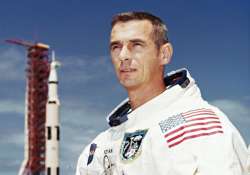Gene Cernan, last astronaut to walk on moon, dies at 82
US astronaut Gene Cernan - the last man to walk on the Moon – passed away here on Monday. He was 82.

US astronaut Gene Cernan - the last man to walk on the Moon – passed away here on Monday. He was 82.
America's space agency Nasa said that it was ‘saddened by the loss of the retired spaceman’.
Cernan was with his relatives when he died at a Houston hospital following ongoing heath issues, family spokeswoman Melissa Wren said.
"Even at the age of 82, Gene was passionate about sharing his desire to see the continued human exploration of space and encouraged our nation's leaders and young people to not let him remain the last man to walk on the Moon," his family said in a statement released by NASA.
Cernan was commander of NASA's Apollo 17 mission and on his third space flight when he set foot on the lunar surface.
On December 14, 1972, he became the last of only a dozen men to walk on the moon and he traced his only child's initials in the dust before climbing the ladder of the lunar module the last time. It was a moment that forever defined him in both the public eye and his own.
"Those steps up that ladder, they were tough to make," Cernan recalled in a 2007 oral history. "I didn't want to go up. I wanted to stay a while."
Cernan called it "perhaps the brightest moment of my life. ... It's like you would want to freeze that moment and take it home with you. But you can't."
Decades later, Cernan tried to ensure he wasn't the last person to walk on the moon, testifying before Congress to push for a return. But as the years went by he realised he wouldn't live to witness someone follow in his footsteps still visible on the moon more than 40 years later.
"Neil (Armstrong, who died in 2012) and I aren't going to see those next young Americans who walk on the moon. And God help us if they're not Americans," Cernan testified before Congress in 2011. "When I leave this planet, I want to know where we are headed as a nation. That's my big goal."
Cernan died less than six weeks after another American space hero, John Glenn, the first American to orbit the Earth in 1962. Their flights weren't the first or last of the Mercury and Apollo eras. Yet to the public they were the bookends of America's space age glory.
On December 11, 1972, Cernan guided the lander, named Challenger, into a lunar valley called Taurus-Littrow, with Harrison "Jack" Schmitt at his side. He recalled the silence after the lunar lander's engine shut down.
"That's where you experience the most quiet moment a human being can experience in his lifetime," Cernan said in 2007.
"There's no vibration. There's no noise. The ground quit talking. Your partner is mesmerized. He can't say anything. The dust is gone. It's a realisation, a reality, all of a sudden you have just landed in another world on another body out there (somewhere in the) universe, and what you are seeing is being seen by human beings, human eyes, for the first time."
With AP Inputs